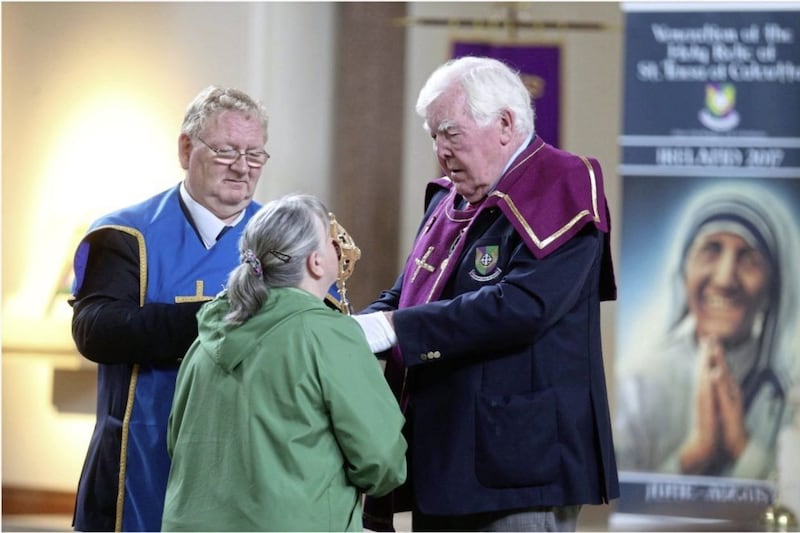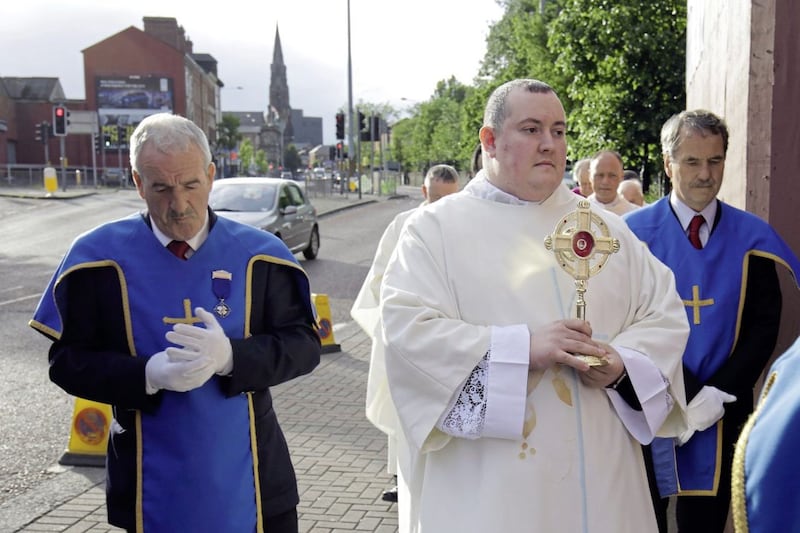My ardently life-affirming mother, a peace activist in the 1970s, has died aged 95 of frailty and dementia, her daughter cradling her hand.
She was born Margaret Hughes into the divided and fractious new Northern Ireland and she outlived most of her peers: those barefoot Catholic schoolgirls staring gauntly out of pre-war class photographs.
Pragmatic acceptance of unionist rule and canny distrust of ideologies came with the genteel poverty of a Falls Road upbringing.
Born in Omagh in 1929, her family moved to Belfast a few years later. One of six children of William Hughes, a ladies’ hairdresser, and Jeannie, she was always known as Rosaleen (‘little Rose’).
After the death of her younger brother, Cyril, Jeannie became mentally unsound. My mother lost some of her early childhood caring for four siblings. But she was happier at Dominican College, Fortwilliam, and remembered arriving one morning after a wartime blitz to find it untouched among the rubble of the Antrim Road.
Not long after that, her brother Wilfie joined the RAF. Their grandmother had married a British soldier. Yet they retained republican credentials: an uncle on a prison ship.
She left school at 16, and could always find, discard and pick up another job, as she did men, who usually adored her. She rejected Chieftain Paddy Maloney. During a stint at Short and Harland she was taught book-keeping.
She was a passionate dancer and at a ball at Belfast Castle a man from The Irish Press approached and asked to photograph her. Raphael MacCann was a nifty dancer and, she believed, from a landed family. She was impressed that they had a telephone in its own booth and dressed for dinner. They married in 1959.
Rafe only then admitted that there had never been any film in his camera. He lost his job and the expected inheritance from his mother was spent.

The family adopted a more anglicised spelling of Rafe’s surname even before they moved to Manchester, where he found work as a postman. Rosaleen became a secretary at The Manchester Grammar School while raising two babies. But by now she was disillusioned and, missing west Belfast’s “warm humanity”, she insisted they return in 1965.
She made a home in Andersonstown and planted a flamboyant, multi-coloured garden in surroundings increasingly scarred by barbed wire and self-inflicted vandalism. Young British troops used to crouch in our Canterbury bells which daringly bobbed over our graffitied wall.
Her generation observed and some tried to resist the steady corruption of society by forces of anarchy, mob rule, life-denying cynicism, property appropriated at gunpoint, the personal claimed as political.
She worked as a counter clerk at the local post office, which was raided weekly by thugs posing as republicans and she suffered, but overcame, a nervous breakdown.

In the late 1970s she marched as a member of the Peace People organisation. Her perseverance inspired her neighbours at a time when even the efforts of Mother Teresa to empower people in Ballymurphy were thwarted by local politics. Waiting to catch a train to Dublin in 1971, the nuns brought her to my mother for a meal. She wasn’t impressed by the saint-to-be, finding the clergy on the whole unhelpfully segregationist.
She went on to create cross-community projects, including quiz nights, afternoon teas and discussion evenings about local problems, and brainstorming sessions to deconstruct sectarian division. She and her fellow campaigners fired off letters and met politicians to further the cause of integrated education.
Without sharing a word, she conquered cancer and after my father’s death in 1993, she gained a new lease of life. She adopted the more English name Rose, learned yoga and line dancing, and sang in the choirs of St Patrick’s Church, Lisburn, and Queen’s University. She astonished her doctor by waking after brain surgery, and in her eighties she visited Brazil.
Rose McCann died on May 11. She is survived by her children – my sister, Carol, and me – by my three children, and by her sister, Eileen.








